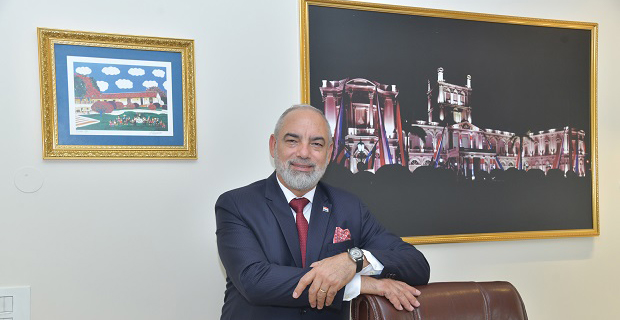“Strategic Partners, Shared Aspirations”
As Latin America takes on greater significance in India’s foreign policy, Paraguay is emerging as a vital gateway for deeper engagement with the region. In this exclusive and timely conversation, H.E. Mr. Fleming Duarte, Ambassador of Paraguay to India, speaks with India Empire’s Editor and Publisher Sayantan Chakravarty and Business and Diplomatic Editor Yogesh Sood on the eve of President Santiago Peña’s first State Visit to India, scheduled from June 2, 2025. Ambassador Duarte discusses the visit’s objectives, the shared values uniting both democracies, and the strategic opportunities that lie ahead for bilateral cooperation in trade, energy, education, and cultural exchange.
What are the key objectives of President Santiago Peña’s visit to India, and what strategic outcomes are expected from his meetings with Indian leaders?
President Santiago Peña’s visit to India reflects Paraguay’s growing interest in deepening its engagement with Asia’s largest democracy and fastest-growing major economy. The primary objectives of the visit include strengthening bilateral economic ties, promoting Paraguay as a strategic destination for Indian investment, and enhancing Paraguay’s visibility as a regional integration hub in South America.
At the core of the agenda is the drive to attract Indian investment into high-potential sectors such as biofuels (especially ethanol, textiles, agrofertilizers), clean and renewable energy, agro-industry, manufacturing, logistics, and services. With its surplus of renewable hydroelectric power, a competitive tax and regulatory environment, macroeconomic stability and access to the MERCOSUR market, Paraguay offers an attractive proposition for Indian firms seeking efficient and strategically located production bases in the Americas.
Expected strategic outcomes of the visit include:
- Advancing discussions on joint ventures and investment facilitation, including incentives under Paraguay’s investor-friendly Maquila regime.
- Positioning Paraguay as a reliable gateway to the MERCOSUR trade bloc and the broader Southern Cone region.
- Exploring sector-specific cooperation in areas like industrial development, logistics infrastructure, and energy collaboration.
- Strengthening high-level institutional dialogue with a view to initiating steps toward development credit lines, trade or investment agreements.
President Peña’s engagements in India are expected to elevate Paraguay’s profile among Indian business leaders and policymakers, fostering long-term strategic partnerships that align with both countries’ development priorities and global aspirations.
Paraguay and India have shared democratic values and growing economic ties. How do you see this visit enhancing political and diplomatic relations between the two countries?
This visit represents a pivotal moment in the Paraguay–India relationship, offering a unique opportunity to consolidate strategic partnership rooted in shared democratic values, mutual respect, and a commitment to global cooperation. Both countries are vibrant democracies that support pluralism, rule of law, and inclusive development—principles that form a strong foundation for enduring political and diplomatic engagement.
Paraguay and India also share a demographic bonus with a young population, around 70% of their population are 35 years old in average. Just like India, Paraguay too is blessed with diverse flora and fauna, abundant fresh water, and rich natural resources.
President Peña’s high-level meetings with Indian leaders are aimed at elevating political dialogue to a new level, fostering deeper understanding and alignment on a range of bilateral and multilateral issues. This includes enhanced coordination on global governance challenges, South–South cooperation, sustainable development, and regional diplomacy—particularly within the context of Latin America and the Indo-Pacific.
The visit also lays the groundwork for institutionalizing regular political consultations, expanding parliamentary and ministerial exchanges, and formalizing future initiatives in trade, investment, culture, education, and science and technology. It symbolizes not just a diplomatic gesture, but a strategic intent to expand the scope of bilateral engagement beyond economics into a broader and more meaningful partnership between two emerging nations.











Comments.